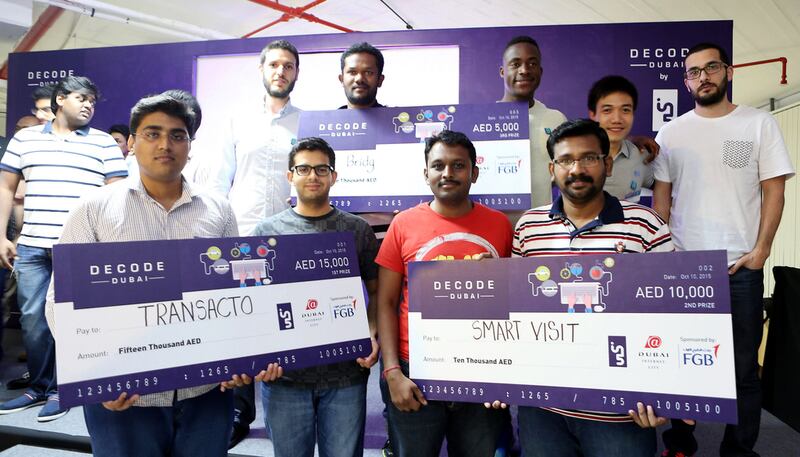Is it possible to design and build a new app in just 36 hours? The winning team at Decode Dubai’s recent Hackathon discovered it is.
Some of the UAE’s most innovative minds were set the challenge of developing financial technology mobile apps in a short time frame at the event, which was organised by Dubai Internet City (DIC) to foster the creation of new start-ups.
Hackathons are all-night coding sessions where ideas are brainstormed and built, fuelled by adrenalin and copious amounts of coffee.
It usually takes about 18 weeks to build a mobile app, according to a 2013 survey of 100 mobile designers by Kinvey and AYTM. But speed was of the essence at the third edition of Decode Dubai this month, where the 22 teams entering were given just 36 hours.
The winning Decode Dubai team, Transacto, was made up of the Indian friends Sufiyan Yusuf, 23 and Suraj Shirvankar, 22, with their creation, an app that organises the notifications users receive for their banking transactions more efficiently.
Smart Visit was runner-up, and Bridg came third.
Mr Yusuf says they spent a sleepless night toiling over their invention to scoop the Dh15,000 top prize.
“We worked very hard. But neither of us expected to win, so I feel really humble,” he says.
His partner, Mr Shirvankar, says they only went along for the experience. His technical expertise is normally applied to helping others build their ideas in his job for a Dubai-based start-up accelerator.
“We thought it would be something fun, for bonding as well as for developing the app,” he adds. “This stuff is what we love to do.”
According to Ryan Tate, author of The 20% Doctrine on hackathons and other forms of in-house innovation, "hack days" were pioneered at Yahoo by Chad Dickerson, now the chief executive of Etsy.
But it was Facebook, taking inspiration from the college all-nighter, which came up with the hackathon formula. Hackathons are now part of the start-up culture throughout Silicon Valley and in the UAE; they’ve also been organised by New York University Abu Dhabi.
At the first Decode Dubai back in January, the mandate was to build apps focused on improving the lives of Dubai residents. The second, in June, brought together more than 120 developers to focus on the smart themes of shopping and retail, culture and tourism, urban mobility, energy and emission, and collaborative city.
The financial technology theme for the latest round sought to take advantage of the current “fintech” start-up boom. According to the research firm CB Insights, venture capital is pouring into FinTech, with firms attracting US$12 billion of investment globally last year (up from $4bn in 2013).
Four days before the hackathon began, Mr Shirvankar and Mr Yusuf, a freelance web and app designer, started brainstorming.
“Our idea was so simple, we don’t know why it hasn’t been implemented before,” says Mr Shirvankar. “It reads the SMSs the bank sends you so you can see your monthly and daily expenses. It simplifies the process. You don’t need to log in, you don’t need an account, you just install the app and that’s it.”
By the time the 36 hours was up, Transacto’s app was up and working with two banks – although the pair say 36 hours wasn’t long enough to develop the design side of the app. “Now we have the building blocks. We’ll now build it up for each bank so that anyone in Dubai can use it,” says Mr Shirvankar.
The judging panel that picked Transacto as the winners was made up of representatives from Beehive, Precinct Partners, PayFort, Telr, Gulf Investor Circle Group and FGB, which also provided the cash prizes.
Ammar Malik, the head of business development for DIC and Dubai Outsource Zone, says the event was a networking opportunity for application developers, designers, students and entrepreneurs.
“The idea is to mix all these people together so they get to know each other,” he says. “The more networking they do, the more chance that they will develop something for the community of tomorrow.”
DIC was named a strategic partner for Smart Dubai by the Executive Smart Committee this year, with a mandate to spearhead the development and support of start-ups, entrepreneurs and application developers.
It has since headlined a number of initiatives fostering the development of new ideas. In February, the first Drones for Good competition gave away $1 million for a Swiss search and rescue drone. And in April, HackaMena brought together technopreneurs to attempt to solve the world's problems in 72 hours.
DIC is also building an Innovation Hub, set to open in 2019, to provide 1.6 million square feet of dedicated space to about 15,000 knowledge and creative workers. For the technopreneurs from Decode Dubai, though, there’s good news. Mr Yusuf does not think this will be the last hackathon. “We need more events like these in Dubai to encourage start-ups to build amazing products,” he adds.
business@thenational.ae
Follow The National's Business section on Twitter





